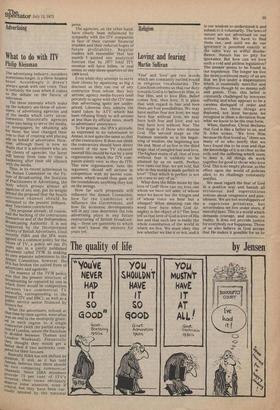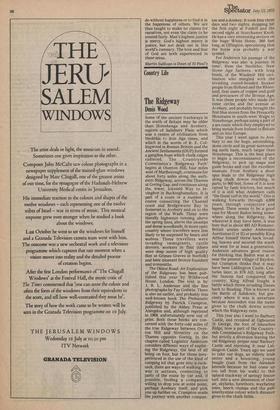Loving and fearing Martin Sullivan
'Fear' and love' are two words which are constantly rattled round in religious vocabularies. The Catechism informs us that our duty towards God is to believe in Him, to fear Him, and to love Him. Belief comes first, then love. It is plain that with regard to fear and love there are four possibilities. We may have neither fear nor love; we may have fear without love; we may have both fear and love; and we may have love without fear. The first stage is of those who dismiss God. The second stage as the Psalmist reminds us is the beginning of wisdom, the beginning not the end. Most of us live in the third stage, that of mingled fear and love. The highest realm of all, that of love without fear is unlikely to be attained by us on earth. Perfect love casts out fear, we are told, but who in this world is made perfect in love? -That which is perfect is not yet come to any of us."
What does the Bible mean by the love of God? How can we love one whom we have not seen, of whose ways we know but the fringes and of whose voice we hear but a whisper? What meaning can the word 'love' have when God Almighty is the object of it? The Jews tell us that love of God is love of His law and that such law is really the whole constitution of the world in which we live. We must obey this law whether we like it or not, and it is our wisdom to understand it and submit to it voluntarily. The laws of nature are not advertised on our notice boards. We have to find them out, and until we do our ignorance is punished exactly in the same way as wilful disobedience. Nature has no pity for ignorance. But how can we love such a cold and pitiless legislation? The answer seems to be found in our experience. The longer we live the more convinced many of us are that we live under a dispensation which is essentially merciful and righteous though by no means soft and gentle. True, this belief is constantly challenged by innocent suffering and what appears to be a careless disregard of order and justice, but these things are deplored, not least because we recognise in them a deviation from what we know to be the true form.
When, therefore, Christ declares that God is like a father to us, and St John writes, "We love Him because He first loved us," there are many of us who testify that we have found this to be true and that the knowledge of it is as clear as the evils and the suffering which seem to deny it. All things do work together for good to those who love God. This is no empty phrase, as the effect upon the world of policies alien to its challenge constantly testifies.
We must regard the fear of God in a positive way and banish all erroneous and superstitious notions about vengeance and punishment. We are not worshippers of a capricious potentate, but nevertheless we live under stern, if merciful laws This is a world which demands courage, and insists on reality. It does not provide justice for everybody nor happiness. Those of us who believe in God accept that He makes it possible for us to
do without happiness or to find it in the happiness of others. We are thus taught to make no claims for ourselves, not even the claim to be treated fairly. Man's highest justice is mercy. God's highest mercy is justice, but not dealt out in this world's currency. The love and fear of God are both experienced in these areas.
Martin Sullivan is Dean of St Paul's
Country Life



































 Previous page
Previous page